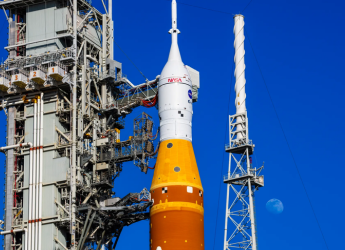- Home
- Science
- Science News
- ISS Experiment Shows Moss Spores Can Survive Harsh Space Environment
ISS Experiment Shows Moss Spores Can Survive Harsh Space Environment
A resilient moss species survived 9 months outside the ISS, enduring vacuum, radiation and extreme temperature swings.

Photo Credit: ESA
Moss survived 9 months on the ISS exterior; over 80% of spores endured harsh space, for Moon-Mars use
An extraordinary species of moss was able to endure nine months in the exterior of the International Space Station (ISS) and was still able to grow in the world. In a recent study, scientists placed moss spores in the vacuum, in the extreme radiation and temperatures of space, over a period of approximately 9 months, and more than 80 percent of the samples survived and germinated after being placed back on Earth. The barrenness of this plant is brought out by this unlikely outcome.
Implications for Space Exploration
According to the new study, scientists have demonstrated that a land plant can survive in space, which was the first time. The findings indicate that early terrestrial vegetation such as moss, has inherent mechanisms of extreme condition survival. Fujita observed that this resilience would guide the development of ecosystems in the Moon or Mars. Even though it is not edible, the capacity to produce oxygen and even create soil gives moss a possibility of being used as a life support on other planets. More experiments are required to determine whether moss can actively develop under low gravity or in other alien atmospheres.
Space Exposure Experiment
Researchers sent samples of a hardy moss called spreading earthmoss (Physcomitrium patens) to the ISS in March 2022. Astronauts fixed them to the station's exterior and left them exposed for about 283 days. Once returned to Earth, tests showed that over 80% survived the vacuum, radiation and temperature extremes of space. Nearly 90% of the survivors could germinate under Earth conditions. Researchers estimated the spores could potentially survive up to about 5,600 days (15 years) in space.
Get your daily dose of tech news, reviews, and insights, in under 80 characters on Gadgets 360 Turbo. Connect with fellow tech lovers on our Forum. Follow us on X, Facebook, WhatsApp, Threads and Google News for instant updates. Catch all the action on our YouTube channel.
- Samsung Galaxy Unpacked 2026
- iPhone 17 Pro Max
- ChatGPT
- iOS 26
- Laptop Under 50000
- Smartwatch Under 10000
- Apple Vision Pro
- Oneplus 12
- OnePlus Nord CE 3 Lite 5G
- iPhone 13
- Xiaomi 14 Pro
- Oppo Find N3
- Tecno Spark Go (2023)
- Realme V30
- Best Phones Under 25000
- Samsung Galaxy S24 Series
- Cryptocurrency
- iQoo 12
- Samsung Galaxy S24 Ultra
- Giottus
- Samsung Galaxy Z Flip 5
- Apple 'Scary Fast'
- Housefull 5
- GoPro Hero 12 Black Review
- Invincible Season 2
- JioGlass
- HD Ready TV
- Latest Mobile Phones
- Compare Phones
- Realme P4 Lite
- Vivo V70
- Vivo V70 Elite
- Google Pixel 10a
- Tecno Camon 50
- Tecno Camon 50 Pro
- Lava Bold N2
- Vivo V60 Lite 4G
- LG Gram 14 (2026)
- Asus Vivobook 16 (M1605NAQ)
- Infinix Xpad 30E
- Brave Ark 2-in-1
- Amazfit T-Rex Ultra 2
- boAt Chrome Iris
- Xiaomi QLED TV X Pro 75
- Haier H5E Series
- Asus ROG Ally
- Nintendo Switch Lite
- Haier 1.6 Ton 5 Star Inverter Split AC (HSU19G-MZAID5BN-INV)
- Haier 1.6 Ton 5 Star Inverter Split AC (HSU19G-MZAIM5BN-INV)












